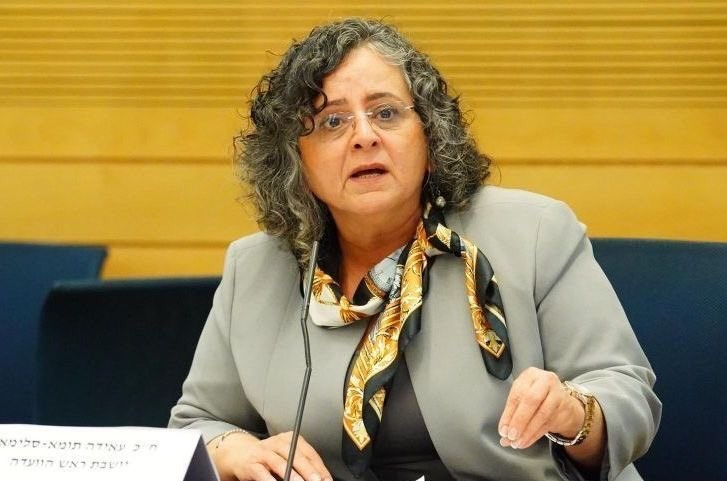The Ministerial Committee on Legislation rejected on Sunday, October 24, a bill that would have established a National Day of Mourning to commemorate the victims of the 1956 Kfar Kassem massacre in which 49 Arab citizens of Israel were killed by security forces.
Regional Cooperation Minister Esawi Frej (Meretz), a resident of Kfar Kassem, asked to delay the vote on the bill submitted by Joint List MK Aida Touma-Sliman (Hadash) in order to give the government time to consider its own position on the subject.
Joint List MK Aida Touma-Sliman (Hadash) submitted the bill to commemorate the 1956 Kfar Kassem massacre which was rejected by the Ministerial Committee on Legislation on Sunday, October 24.
(Photo: Knesset)
However, the Joint List intends to bring the bill to a vote in the Knesset plenum today, Wednesday, October 27, as it does every year towards the anniversary of the massacre. The bill will constitute an embarrassment for coalition Ra’am and Meretz MKs and ministers, especially Frej, who have introduced similar bills in the past. Last week, with the support of opposition’s Likud, Shas and United Torah Judaism, Joint List MK Ahmad Tibi (Ta’al) succeeded in passing a bill calling for a commission of inquiry on education in the Arab sector regarding the event.
On October 29, 1956, on the eve of the Israel’s Sinai campaign against Egypt, Israeli Border Police shot to death 49 unarmed Arab-Palestinian citizens of Israel returning home from work during a curfew which had been imposed earlier in the day, after they had already left their homes in the morning and of which they were therefore unaware. Among those killed were six women and 23 children aged 8 to 17.
News of the massacre leaked out almost immediately. However, it took two months of lobbying by Communist Knesset Members Tawfik Toubi and Meir Vilner and members of the press (from Kol Ha’am, Al Ittihad and Haolam Haze newspapers) before the government lifted the media blackout imposed by then Prime Minister David Ben-Gurion. To limit publicity, a military cordon was maintained around the village for months, preventing journalists from approaching.



